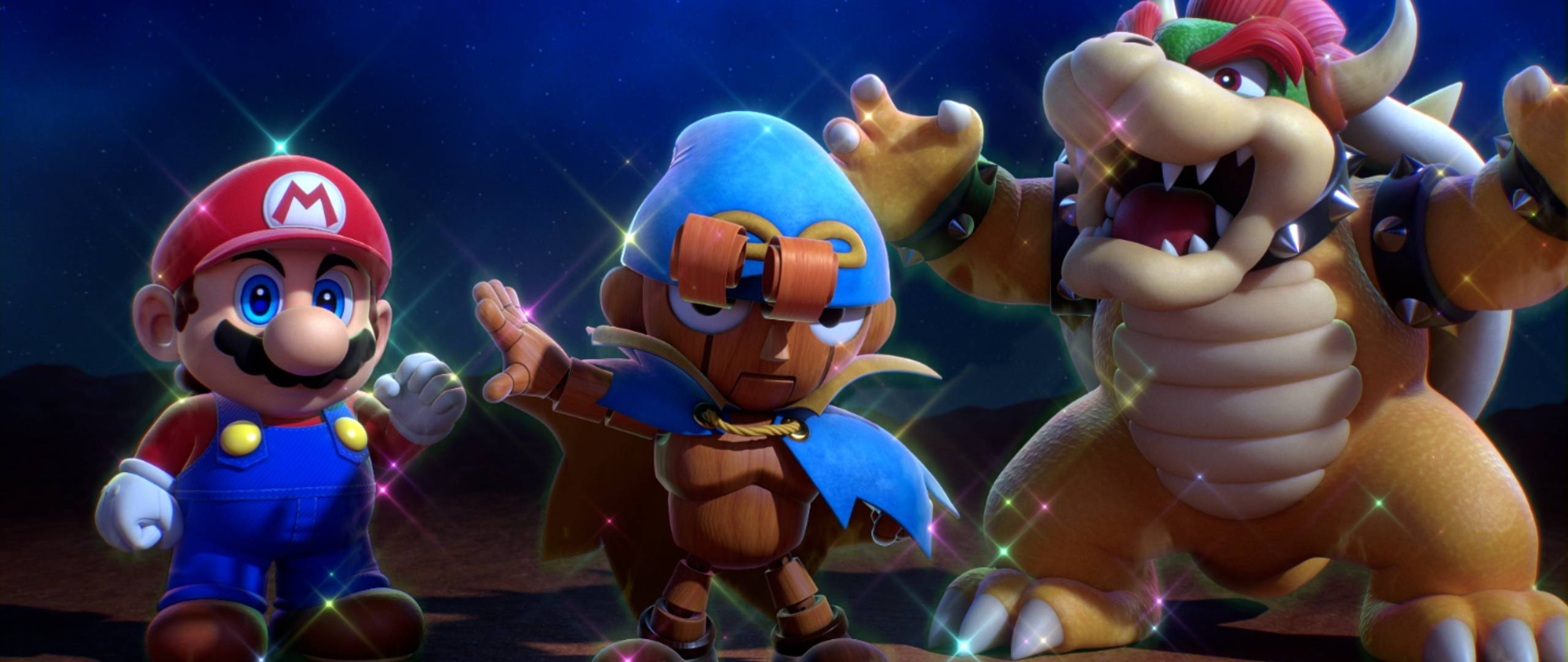TechRadar Verdict
Super Mario RPG is a faithful remake of an excellent game. With a fleshed-out battle system, enhanced visuals, and a stellar remastered soundtrack, this is the best way to find out why so many people wanted Geno in Super Smash Bros. Ultimate.
Pros
- +
Fantastic sense of humor that encourages exploration
- +
Gorgeous, switchable soundtrack
- +
Stunning cutscenes bring major scenes to life in a brand-new way
Cons
- -
Fixed camera makes platforming sections frustrating
- -
Finding hidden treasures is tedious
- -
Some areas feel barren
Why you can trust TechRadar
Platform reviewed: Nintendo Switch
Available on: Nintendo Switch
Release date: November 17, 2023
Super Mario RPG is not a game that takes itself seriously. It’s a game that sees Mario’s nemesis, Bowser, sob when things don’t go his way, characters do adorable jigs as they level up, and cakes turn into sentient bosses. Not to mention Mario, Bowser, and another man after Peach’s heart sharing a tender group kiss. Those things are also what made the Super Nintendo Entertainment System version so beloved, and equally what prevail in making the Nintendo Switch remake a must-play for anyone who never experienced the original turn-based role-playing game.
The adventure starts how you’d probably expect a Mario story to: Bowser has once again kidnapped Princess Peach and it’s Mario’s job to save her. However, things don’t exactly go to plan for anyone, as a force known as the Smithy Gang descends upon the Mushroom Kingdom, destroying the Star Road - a mysterious place where wishes come true - in the process. This invasion also sees Bowser kicked out of his own castle and makes Peach go missing.
After this, Mario sets out on a journey to find the princess but ends up joining forces with an emotional, kindhearted fellow called Mallow, and later Geno - a warrior from Star Road itself who inhabits a wooden doll. His goal is to gather up seven scattered Star Pieces from across the land to fix the Star Road and make it possible for wishes to come true again. This trio later ends up recruiting the princess herself and even Bowser to restore the Mushroom Kingdom and its wish-granting process to normality.
Time to fight
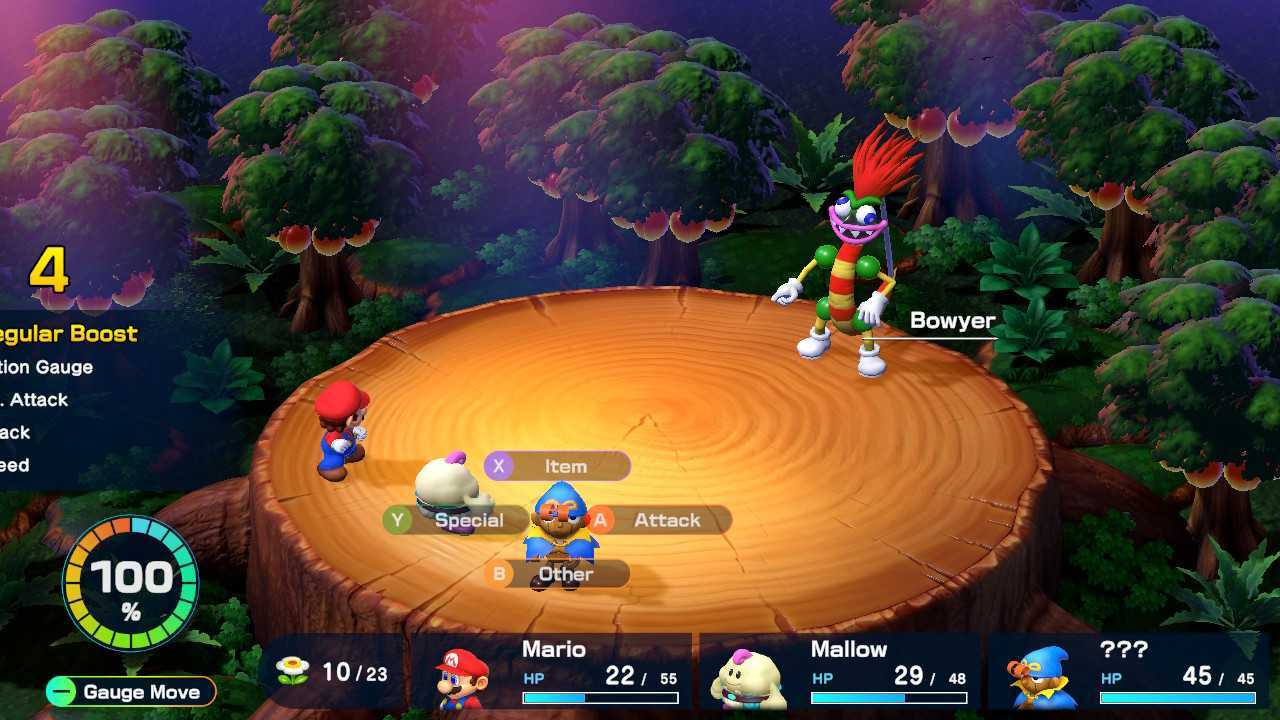
A staple part of this quest is battling, and improvements have been made to the timed button press system veteran players will remember well. As discussed in my Super Mario RPG preview, like in the original SNES version, pressing the ‘A’ button right before an attack is about to hit you or as one of your party members makes contact with an enemy will reduce the damage you receive or boost your attack power - these are officially known as Action Commands. Depending on how good your timing is, damage against you can be totally negated, and on the attacking front, perfectly timed button presses will inflict splash damage on every foe on the screen.
Pulling off these Action Commands will boost the all-new Action Gauge, and when filled, the three active party members can unleash a powerful Triple Move. These vary depending on the characters that are out on the field. My favorite is the Invincible Shell Strike, which sees Peach toss a Super Star at Bowser and Mario deftly drop-kick him straight into every foe standing against them.
Executing multiple Action Commands in a row also builds up a chain, which gradually applies buffs to the party depending on how long you manage to keep it going for. All of this, combined with the fact that the timing of Action Commands varies depending on what moves are being used, makes for an engaging and satisfying battle system that doesn’t ever get stale.
With that said, the overall difficulty level of Super Mario RPG tends to be rather low. I played on the standard Normal mode and can only think of one occasion when I fell in battle. Most bosses go down quickly, and I actually found that some miscellaneous powered-up foes (which can be encountered randomly out in the world) posed more of a threat than most of the main bosses.
Sign up for breaking news, reviews, opinion, top tech deals, and more.
While that’s perhaps not the best news for anyone hoping for a challenge, this also means that grinding isn’t a requirement whatsoever. I was never forced to run around completing battles just to level up - in fact, I ended up skipping many fights since non-essential enemies can be avoided on the overworld.
All heart
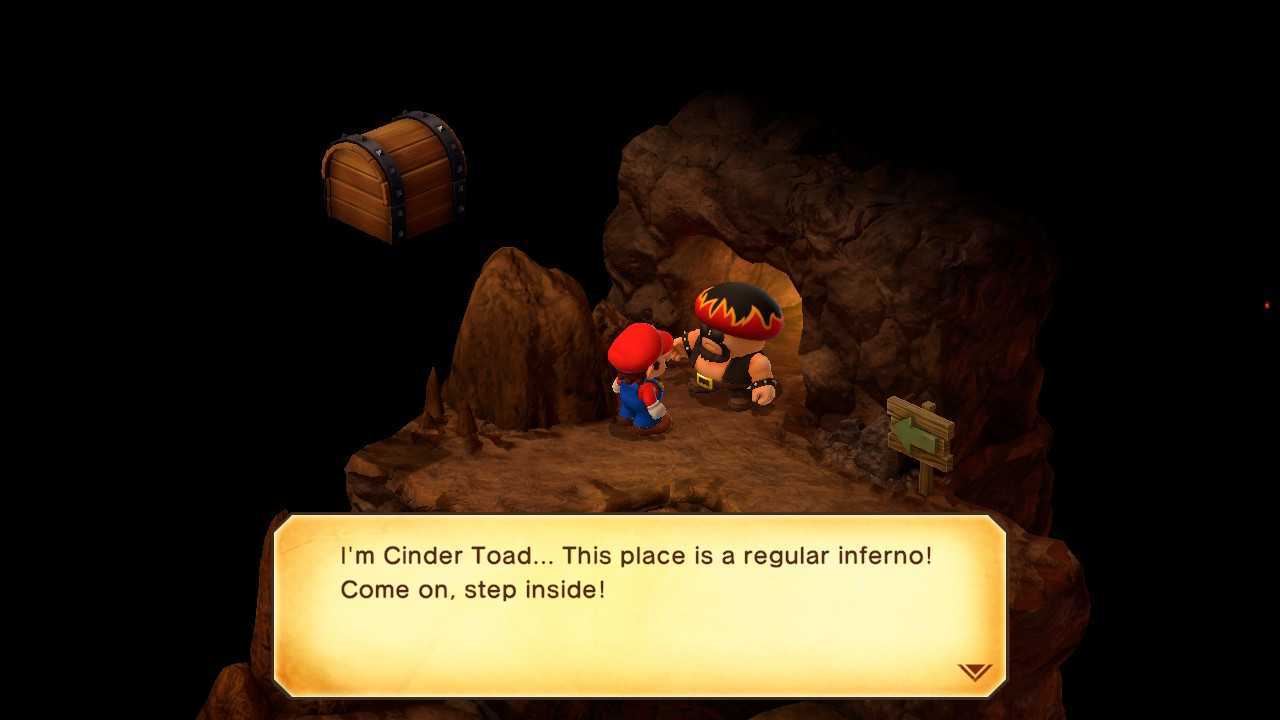
While battling is fantastic fun, Super Mario RPG’s greatest strength is its heart and whimsy. As mentioned above, it’s a very lighthearted game. Most adversaries are very silly, and every single NPC is worth talking to due to the funny phrases they come out with. I’ve had a shopkeeper Toad get annoyed at me for walking around the back of his counter, a baker Torte (an armored Koopa Troopa) chastise me for jumping on his cake, and another random Toad makes a James Bond reference out of nowhere.
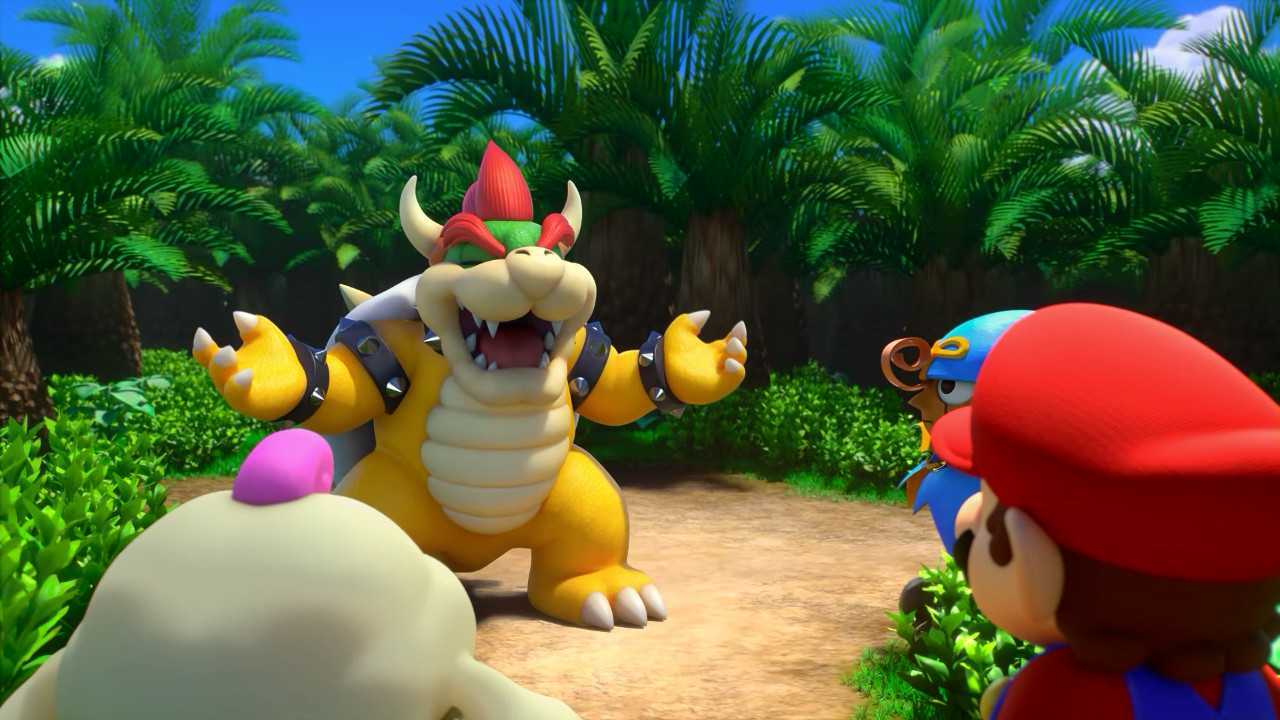
Literally any time Bowser was on the screen. His characterization is delightfully goofy, and anyone who missed out on playing the original version but fell in love with his depiction in The Super Mario Bros. Movie will adore him.
Also delightful are the character designs themselves - I don’t know why it amused me so much to encounter a buff, burly Toad with sunglasses, a beard, and spiked leather wristbands, but finding the guy hiding away in the Barrel Volcano was a real highlight. The same goes for the mustachioed Chancellor Toad and the tough blue Yoshi of Yo’ster Isle, Boshi. In modern Mario games, we rarely see such distinct variations on the series’ staple characters like this, so it’s brilliant to see them back in newly-remade form.
As you’d expect from a remake created about 27 years after the original, everything looks, sounds, and feels far better than ever before. While I adore the newly remastered soundtrack, you’re able to swap to the original SNES music at any time in the main menu, which nostalgic fans may enjoy. The colors pop on the Nintendo Switch OLED’s screen, making each area in the world a genuine joy to wander around, too.
Treasures and tedium
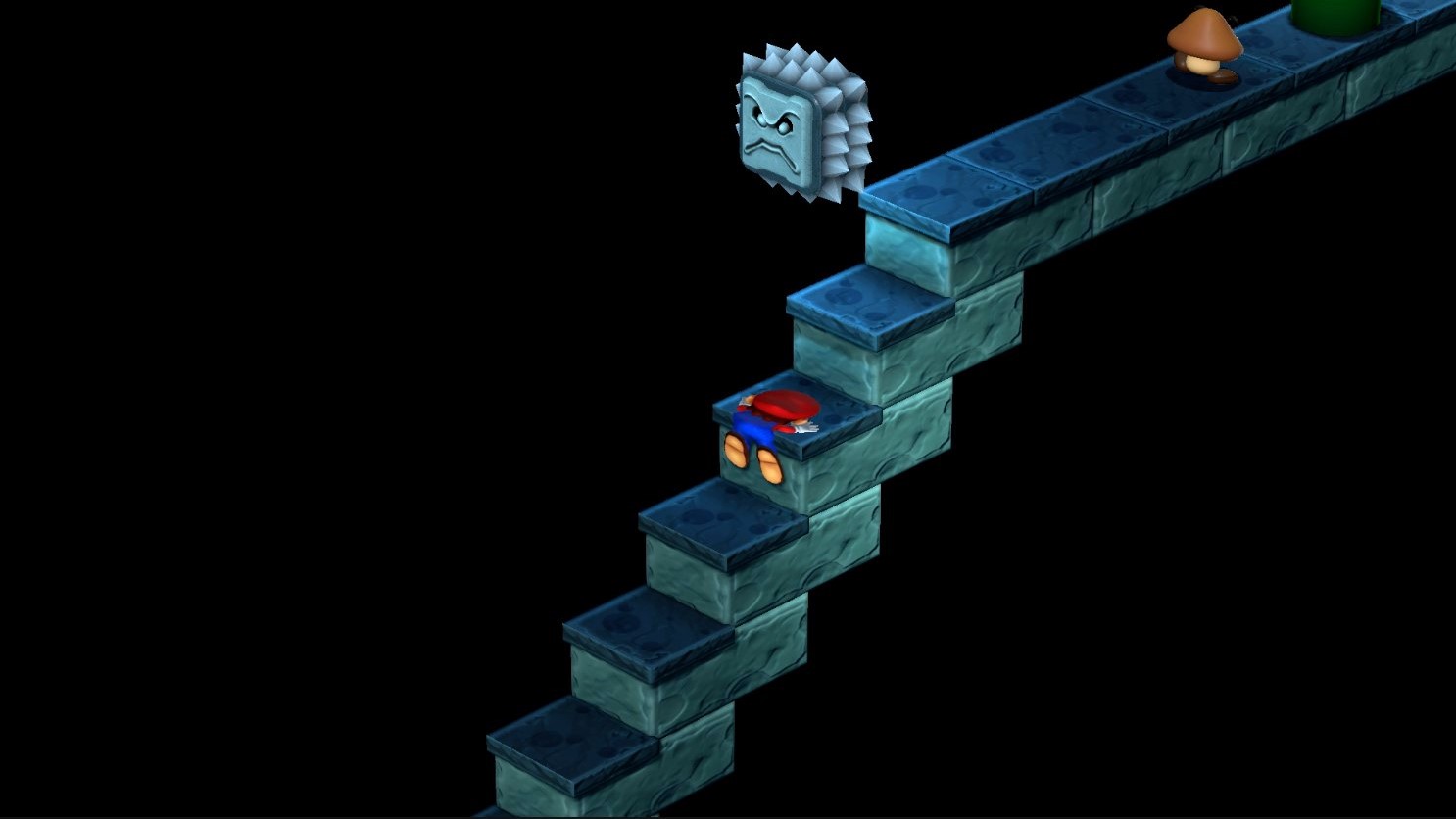
Unfortunately, some areas do feel a little barren of things to do. The main incentive to scour locations is the existence of Hidden Treasure Chests - boxes with items that are completely invisible until you jump underneath them. Although it’s possible to equip items to help locate these, anyone looking for them can expect to spend a lot of time jumping on every tile in an area hoping to find something. This gets tedious fast, and the treasures themselves often aren’t worth the effort it takes to discover them.
My other gripe with Super Mario RPG is its fixed camera angle - aside from cutscenes and certain minigames, you can expect your view of Mario and his party to remain the same as you explore, and you have no way to alter it. Most of the time this isn’t a problem, but some areas that require you to make precise jumps to platforms can be awkward to perform when you can’t properly see where you’re going, and have to estimate where you’ll fall with your shadow. Thankfully, this doesn’t occur enough for it to be an overwhelming issue, but it’s still frustrating.
I’ll be honest, I never got to experience the original Super Mario RPG: Legend of the Seven Stars first-hand. My previous knowledge of the game had been limited to YouTube video series, screenshots, and all of the conversations that came with the almighty ‘Geno for Smash Bros.’ campaign (a plight which I can now understand and - to an extent - get behind). However, I can wholeheartedly say that the game is everything I hoped it would be and more.
The gorgeous visuals are brought to life beautifully on Nintendo Switch, with fluid and cheery character animations and spectacular cutscenes which help showcase this esteemed RPG in a way that’s never been seen before. While it’s bound to be a hit with nostalgic fans, the improvements and additions have made Super Mario RPG just as enjoyable for new players in 2023 as the original was all those years ago.
Accessibility features
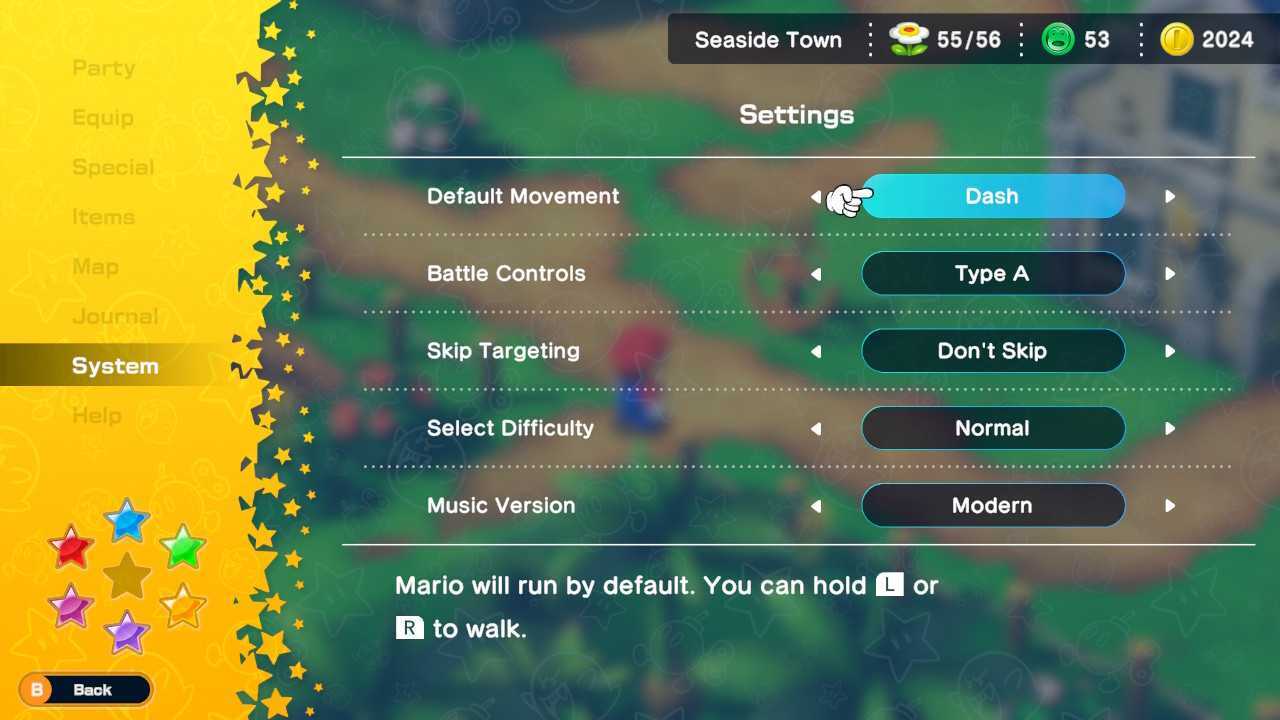
Super Mario RPG doesn’t boast many accessibility features. There are two different set layouts of battle controls to choose from: the first has players press ‘A’ to confirm their moves or ‘B’ to go back when in battle menus, which are opened by pressing the A/B/X/Y buttons; the second has players use these same buttons to open the battle menus, but press the corresponding buttons again to confirm their choices.
By default, Mario is set to automatically run when walking around the world, with the option to hold the L/R buttons to walk. This can be reversed in the menu if you don’t mind holding down L/R to run.
There are two difficulty options to choose from - Normal and Breezy. Breezy is the easier of the two, which makes battles more straightforward and allows players to hold more items (such as heals and buffs).
How we reviewed
I spent around 12 hours playing Super Mario RPG, completing the main story and exploring plenty of side content, including hunting down hidden treasures, going for high scores on minigames such as the Yo’ster Island race and the Minecart ride on Moleville Mountain, and fighting optional bosses. I played on a Nintendo Switch OLED model, in a mix of handheld and docked modes.
If you’re on the lookout for more great games to play on Nintendo Switch, be sure to check out our recommendations for the best Nintendo Switch games. You can also keep up with future releases with our guide to upcoming Switch games.

Catherine is a News Writer for TechRadar Gaming. Armed with a journalism degree from The University of Sheffield, she was sucked into the games media industry after spending far too much time on her university newspaper writing about Pokémon and cool indie games, and realising that was a very cool job, actually. She previously spent 19 months working at GAMINGbible as a full-time journalist. She loves all things Nintendo, and will never stop talking about Xenoblade Chronicles.
